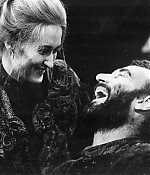|
Simply Streep is your premiere source on Meryl Streep's work on film, television and in the theatre - a career that has won her the praise to be one of the world's greatest working actresses. Created in 1999, we have built an extensive collection to discover Miss Streep's body of work through articles, photos and videos. Enjoy your stay.
|
Celebrating
25 years
of SimplyStreep
|
The Lower Depths
November 04, 1972
· Yale Cabaret
|
From an excerpt of Michael Schulman’s book, Albert Innaurato, who was one year ahead of Meryl at Yale, remembered seeing her for the first time: The acting students were rehearsing Gorky’s “The Lower Depths”, set in a Russian boarding house for the destitute. This was the first time the older classes at the drama school would see the first-years at work. Albert Innaurato, then a second-year playwright, attended expecting – maybe even hoping for – a train wreck. “Everyone was saying, ‘They’re awful, they couldn’t find anybody good. And the pretty one is just horrible. She’s just really bad.'” The “pretty one” was Meryl Streep, who was playing the keeper’s wife. At the climax of Act III, she attacks her own sister in a jealous rage, pushing her down the stairs and scalding her with a bucket of hot water. In the lobby afterward, there was talk of the “charming” actress playing Vassilisa, despite the violence she had just inflicted onstage. “I knew this girl was obviously destined for something very big,” [Yale staffer, playwright and later drama critic] Michael Feingold said, “because if you can do that and have everyone talk about how charming you are, you obviously have some hold over an audience.”
Yale Daily News, November 05, 1972, David Bromwich
The Yale Drama School’s production of “The Lower Depths” was an oddly clumsy affair enlivened now and then by good performances. Oddly, because Gorky left the outlines of his play so clear to the eye that competence hardly seems beyond the reach of an ordinarily well managed group of actors: whereas the Yale company does not begin to look competent until the last act. But we may be taking Gorky too easily, too much for granted. Here as elsewhere he wrote more subtly than he knew – more subtly at any rate than the public idea of him knows. The play has a sense of the humor in low life which O’Neill, for example, utterly lacked when he transported its plot into a barroom for “The Iceman Cometh”. And there is a compelling central character, although Gorky, like his own secondary characters, appears not quite to have understood him. All of the play happens in the basement of a decaying tenement building, and, really, nothing happens. In the third act the landlord (played by Charles Levin in the barmiest hissing and scowling style) is murdMordecai Newman (Luka), Joseph Costa(Vassily), Meryl Streep (Vassilissa), Laura Zucker (Natascha)ered: by whom we do not know, nor do we care, since there are no reckonable consequences. This action like every other in the play is gratuitous, and simiply passes by. How can it change the lives of these people, tenants of squalor who have signed over their lives for the duration?
We are, however, given one pointed interruption. This is the tenancy of the Pilgrim, a Christian perhaps, or something of a narodnik saint, who enters, offers some solace to the most downtrodden members of this desperate crew, and then leaves quite without warning. Obviously Gorky wanted us to make much of him. He must be strong and a little inhuman and also – mysterious. He remains a puzzle to the end, and the one character most affected by this example hangs himself. Yet for all that we do, snese what Gorky wanted the Pilgrim to be, and this brings us to the chief detect of the production at Yale. Mordecai Newman has the role of the Pilgrim. To say that his performance is not strong would be mild, and therefore misleading. He makes the muscle of the drama go limp. Where he ought to be at the magnetic center of the action, he seems to be wandering somewhere about the edges. It is the fault of acting, however, and not choreography. The Pilgrim in this production looks drugged and more than faintly effete: his characteristic smile, far from being compassionate, is primly surperior. How curious that our readiest image of Christian love should be that of the lost adolescent soliciting our services for the God squad. But enough – we may conclude by noting that the play in this version does better when the Pilgrim is there only in spirit. For the rest, there are any number of good and bad moments within the company, but Joseph Costa as Vassily and Meryl Streep as Vassilissa are consistently good.










